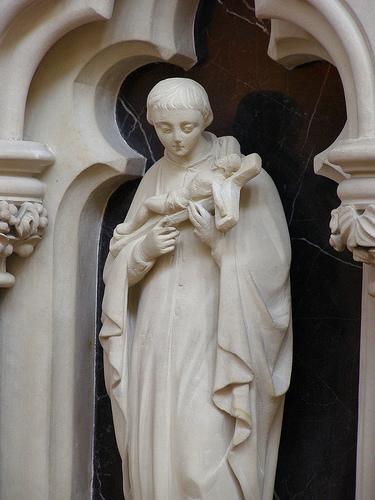Homily for St Aloysius' Day by Fr Michael Holman SJ

We were very happy to welcome Fr Michael Holman SJ to preach at the Solemn Mass for St Aloysius' Day on 21st June. Fr Holman is the former Provincial of the British Jesuits and is now Principal of Heythrop College. Here is his homily:
Six years ago I was in Nairobi, as it turned out for little more than 24 hours. I was changing 'planes on my way back to London from a visit to the Jesuits working in South Africa.
Fr Terry Charlton, the chaplain in Kenya to our Ignatian lay organisation, CLC, the Christian Life Community, asked if I might like to visit their new school which is dedicated to St Aloysius Gonzaga. Given my own background in secondary education, I said I would be delighted.
We travelled in his 4x4 truck to the township of Kibera on the outskirts of the city, reputed to be the largest slum district in Africa. It teemed with people living hugger-mugger in sheds made with whatever wood could be found and (if they were fortunate) a sheet of corrugated iron for a roof. Women washed clothes in a plastic bucket in the streets and crowds of young boys chased footballs made of plastic bags all crammed together and tied up with string. "How are you?" they asked and before I could answer they replied "I am very well, thank you".
The school itself, since rebuilt, was then little more than a slum. One class led into another. Small children and larger children sat attentively in rows. Resources were very poor: a blackboard and chalk, a few exercise books and biros. The teachers were members of CLC and had taken a pay cut in order to teach these children who were, for the most part, orphans whose parents had died from AIDS.
The school was and still is inspired by the example of St Aloysius, this transparently and genuinely good young man whom we remember this evening and who died in Rome on this day in 1591 at the age of 23. He died from the plague which he contracted while nursing the sick.
Nearer to home, we have a school in Glasgow in which for over 150 years young people growing up have been entrusted to the protection, the prayers and the patronage of St Aloysius. This morning, at the mass which celebrated his feast day and concluded the school year, the students will have sung his hymn which includes the refrain "Quid est hoc, quid est hoc, ad aeterna gaudia?" "What is all this compared with the joys of eternity?"
Today and each year, those students celebrate a young man for whom the joys of this world were as nothing compared with what is promised in the life to come. The decisions Aloysius made – to enter religious life and in the process to struggle with the opposition of his father, the Marquis of Castiglione, and to renounce his birthright - were made with his eyes fixed on what mattered most. In these times when we are all, young people most especially, the object of hard sell reinforced with so many sexualised images, it is important to have a patron who helps keep our eyes fixed on what matters most and to make our daily choices accordingly.
Just this last week-end, I attended the annual meeting of the heads of Jesuit theology colleges in Europe. The meeting took place in Naples. On Sunday night we visited the seminary the Society of Jesus runs for the southern dioceses of Italy and we had supper on the terrace overlooking the city and the bay, with views over towards Mount Vesuvius and the isle of Capri. The seminary is dedicated to St Aloysius.
Liker many centres of theology these days, it gives a particular shape to the formation it offers. I see it as providing an education at depth, the kind of depth which comes about when what is learnt is integrated with how students live and in such a way that they can witness effectively to the Gospel to the people of today because they have taken the trouble to understand them.
One imagines that at this very moment on that same terrace with that incomparable view, the 90 or so students and their professors are celebrating their patron whose life displayed a similar integrity and depth as his passionate love for Christ found its expression in his whole-hearted service of some of the poorest in society.
Far from being just a plaster-caste statue or a stained glass window, therefore, St Aloysius - be it in Glasgow or Naples, Nairobi or (I am sure) here in Oxford - lives on in minds and hearts made altogether better by his patronage and his example.
As for myself, what strikes me most about St Aloysius these days? It is the challenge he issues to think seriously about holiness, to consider how our deepest longings really can be satisfied when we live in union with Christ. I have come to see that this is also the source of our apostolic effectiveness. As the previous superior general of the Jesuits, Fr Peter-Hans Kolvenbach wrote, it is "intimacy with Christ which leads naturally to the desire to share that intimacy with others".
Aloysius is characteristically portrayed by his iconographers as wearing a cassock and surplice with the lily of innocence in one hand while gazing longingly at the crucifix he holds in the other.
For many years, to my shame, I was not much helped my these images but now I find myself more and more drawn to look again and to watch as Aloysius contemplates the figure of Christ dying on the cross. As some of us will have read in the divine office this morning, he wrote just before his death to his mother to explain how he was lost and overwhelmed in the immensity of this love, "as deep as the sea and as boundless".
I am lost in admiration for this young man so much inspired by love. Aren't you?
I feely confess that I would so much like to share more deeply in that love myself, to share it with others and like Aloysius to get my life in shape so that this love became the foundation of the every day decisions and choices I make. Wouldn't you?
And I would like that love to find expression in my service of the poor so that I might understand what it means to live a life of integrity and holiness in my life as a priest and a Jesuit and so more convincingly teach others to do the same.
Father, you graced Aloysius with an overwhelming love of your Son and so made him an effective instrument of your love for those who have least. Touch us, we pray, with that some love and help us speak of that of love to others, with words, yes, but with our lives, still more. Through Christ our Lord. Amen.
St Aloysius Gonzaga, pray for us.


